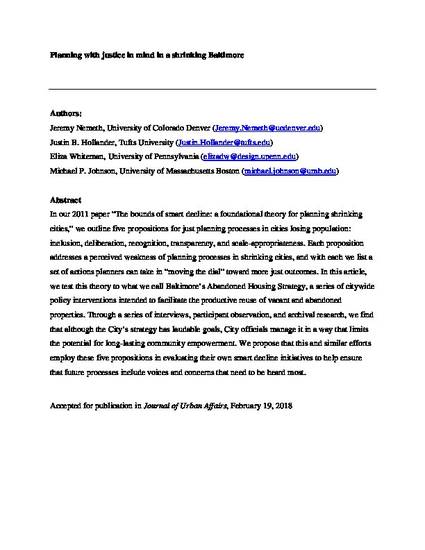
Article
Planning with justice in mind in a shrinking Baltimore
Journal of Urban Affairs
(2018)
Abstract
In our 2011 paper “The bounds of smart decline: a foundational theory for planning shrinking cities,” we outline five propositions for just planning processes in cities losing population: inclusion, deliberation, recognition, transparency, and scale-appropriateness. Each proposition addresses a perceived weakness of planning processes in shrinking cities, and with each we list a set of actions planners can take in “moving the dial” toward more just outcomes. In this article, we test this theory to what we call Baltimore’s Abandoned Housing Strategy, a series of citywide policy interventions intended to facilitate the productive reuse of vacant and abandoned properties. Through a series of interviews, participant observation, and archival research, we find that although the City’s strategy has laudable goals, City officials manage it in a way that limits the potential for long-lasting community empowerment. We propose that this and similar efforts employ these five propositions in evaluating their own smart decline initiatives to help ensure that future processes include voices and concerns that need to be heard most.
Keywords
- Shrinking cities,
- equity,
- inclusion,
- abandoned housing
Disciplines
Publication Date
February 19, 2018
DOI
10.1080/07352166.2018.1454820
Publisher Statement
Accepted for publication in Journal of Urban Affairs, February 19, 2018
Citation Information
Jeremy Nemeth, Justin B Hollander, Eliza Whiteman and Michael P Johnson. "Planning with justice in mind in a shrinking Baltimore" Journal of Urban Affairs (2018) Available at: http://works.bepress.com/michael_johnson/98/
